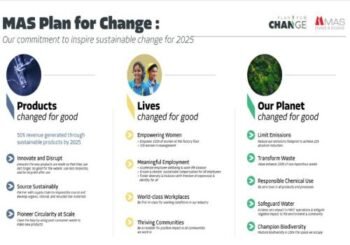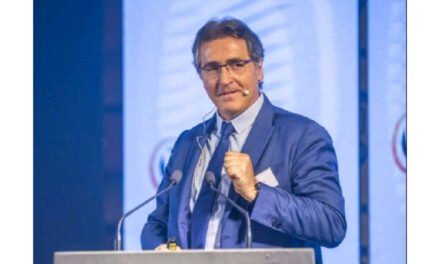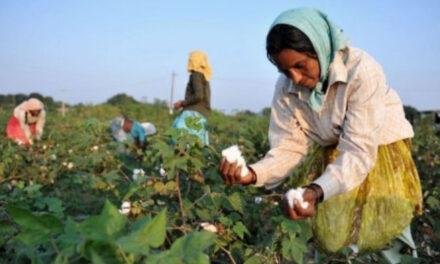 MAS Holdings, one of Sri Lanka’s largest fabric and clothing manufacturers, has announced a sustainability strategy which includes commitments to reduce absolute scope 1 and 2 GHG emissions by more than 25 percent by 2025, compared to a 2019 baseline. Under the new Plan for Change, MAS, which has had its targets approved by the Science Based Targets initiative (SBTi), has also committed to ensuring that 85 percent of its suppliers by spend, will have science-based targets on emissions by 2025.
MAS Holdings, one of Sri Lanka’s largest fabric and clothing manufacturers, has announced a sustainability strategy which includes commitments to reduce absolute scope 1 and 2 GHG emissions by more than 25 percent by 2025, compared to a 2019 baseline. Under the new Plan for Change, MAS, which has had its targets approved by the Science Based Targets initiative (SBTi), has also committed to ensuring that 85 percent of its suppliers by spend, will have science-based targets on emissions by 2025.
The sustainability strategy outlines the company’s efforts to reduce its impact across three focus areas: product, lives and planet; and sets out 12 goals to be achieved by 2025. MAS is pledging that more sustainable product offerings will account for at least half of its revenue by 2025, with a focus on improving products to make them last longer, use fewer resources and be recycled after use.
Attention to sustainable sourcing will be achieved by partnering with MAS’ supply chain partners to select sustainable alternatives to raw materials. Progress towards realizing this goal has already been demonstrated through its partnership with Eco Spindles to create the Sri Lankan Cricket World Cup jerseys from discarded PET in 2019, 2020, and 2021. In 2020 alone, MAS companies recycled over 21 mn plastic bottles to create fabric for its customers.
It has also committed to upcycle all of its non-hazardous waste, be “zero toxic” in all products and processes, safeguard water and restore biodiversity in 100 times the amount of land it occupies. As part of its efforts on climate change, it has installed a multi-roof solar panel initiative – with 48,000 solar panels covering 18 MAS facilities so far – which is contributing to 57 per cent renewable energy usage across global operations.
MAS has also created ‘Eco-Brick’ which converts textile sludge to bricks, as a way of addressing the problem of ETP sludge and effluent waste while simultaneously providing building materials for the company.
The company has also begun work on its commitment to restoring biodiversity across 25,000 acres of land – 100 times its global footprint. So far, 45 habitat restoration projects have been carried out across Sri Lanka, accounting for more than a tenth of the total target.
On social issues, MAS says it provides “safe, secure and comfortable places of work” and pays “fair, equitable wages” at its facilities in 15 countries which employ more than 100,000 people.
“Whether it be climate disasters, overconsumption, inequality, wars, and pandemics, we have witnessed how prolonged, unchecked human activity has negatively impacted our industry and our world,” said Sid Amalean, head of sustainable business with MAS Holdings.
“That is why we have established this plan as the blueprint to create positive change; and we are inspired by these ambitious goals that we have set for ourselves.
“Achieving them will require unprecedented levels of innovation, collaboration, and alignment among our businesses, partners, and supply chain. We are excited to embrace this challenge and hope to create impactful change.”
 MAS Holdings, one of Sri Lanka’s largest fabric and clothing manufacturers, has announced a sustainability strategy which includes commitments to reduce absolute scope 1 and 2 GHG emissions by more than 25 percent by 2025, compared to a 2019 baseline. Under the new Plan for Change, MAS, which has had its targets approved by the Science Based Targets initiative (SBTi), has also committed to ensuring that 85 percent of its suppliers by spend, will have science-based targets on emissions by 2025.
MAS Holdings, one of Sri Lanka’s largest fabric and clothing manufacturers, has announced a sustainability strategy which includes commitments to reduce absolute scope 1 and 2 GHG emissions by more than 25 percent by 2025, compared to a 2019 baseline. Under the new Plan for Change, MAS, which has had its targets approved by the Science Based Targets initiative (SBTi), has also committed to ensuring that 85 percent of its suppliers by spend, will have science-based targets on emissions by 2025.



















